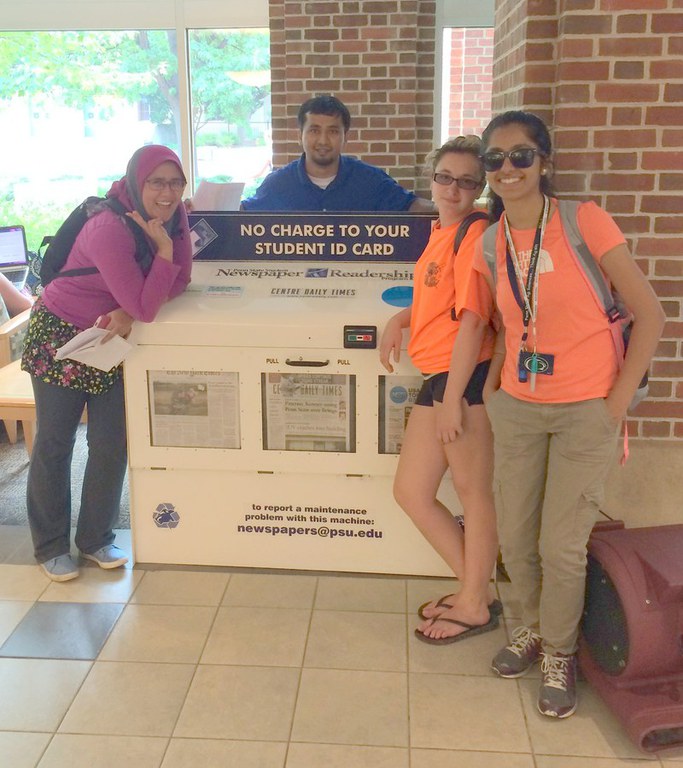Posted: September 24, 2014
Agricultural & Extension Education and INTAD student, Roshan Nayak, gains teaching experience with the Pennsylvania Governor's School for the Agricultural Sciences (PGSAS).

Graduate students Roshan Nayak and Nur Wahid on a global learning resources scavenger hunt with PGSAS participants
By Roshan Nayak
Summer 2014 was not like other summers I had in the past. It was unique one, not because I engaged in multiple outdoor activities, took summer statistics course or my numerous visit to Pegula Ice rink to skate over ice and injure my wrist. It was special because I had the opportunity to teach Pennsylvania Governor's School for Agricultural Sciences (PGSAS) students visiting the University Park campus of Penn State University.
When Dr. Melanie Miller-Foster first shared their plan about teaching PGSAS high school students with me, I felt excited not only because it would give me a chance to meet and teach super-smart high school students from across Pennsylvania. But at the same time it would let me share my academic and personal experience with these students.
Developing a week-long comprehensive curriculum for these students was a challenging task for us. But what else does one need, when you have Dr. Daniel Foster and his team of future Agriculture Educators with you to help you out with every stage of curriculum development? Congratulations to all team members for their effort in preparing lesson plans and executing them so nicely.
Because the course topic was on global agriculture, the diverse backgrounds of our team members with respect to our personal experiences and academic expertise were a plus. It was an amazing experience to work with a group of people who brought different ideas to the table and crafted them together so efficiently. The output was a curriculum that focused on both students' cognitive and skill development. The course lessons ranged from food systems to global food security issues, chocolate tasting to dancing to Malaysian tunes, global competencies to Korean cultural experience. Each lesson plan included lectures, student interactions, group work, and activities, and were organized in such a way to keep students engaged and the topic interesting.
My academic research interest on food systems and food safety prompted me to teach a session on introduction and comparison of food systems in the United States and in India. It was the first time I taught high school students. I was quite amazed and impressed by the different prospective these students brought to the class and by the questions they asked. And of course, for me the best part of my teaching session was our visit to a local Indian restaurant, Indian Pavilion, where students tasted and experienced Indian food. Most of them liked the food, but I still remember facial expressions of few students when they first tasted it.
My learning was not limited to the class teaching experience, but the experience that I gained through the entire process of curriculum development to formative evaluations after the end of each session. Through my graduate course work at the department of Agricultural and Extension Education (AEE), I have learned the key components of effective teaching: clear purpose, objective oriented and student engagement. For me PGSA was just the right opportunity and a starting point to apply those learning in a real classroom setting. In addition to that one of the interesting parts of my learning experience was my interaction with students through various activities, which allowed me to closely observe how students can actively learn through participating in group activities.
Being an international student and with interest in International Agriculture and Development (INTAD) this type of teaching experience is very valuable both for academic as well as personal development. Moreover, I believe that being closely involved in PGSAS has encouraged me to start thinking about introducing similar concepts back home in India. A concept that would be more like creating collaborations between high schools and universities, where high school students will have the opportunities to interact with university faculties and students.
That week of July was one of the best weeks of my time at Penn State - more than just a good memory but a valuable professional development experience as well.
INTAD
Address
Melanie Miller Foster106 Agricultural Administration Building
University Park, PA 16802
- Email mjm727@psu.edu
- Office 814-863-0249
- Fax 814-865-3055
INTAD
Address
Melanie Miller Foster106 Agricultural Administration Building
University Park, PA 16802
- Email mjm727@psu.edu
- Office 814-863-0249
- Fax 814-865-3055

